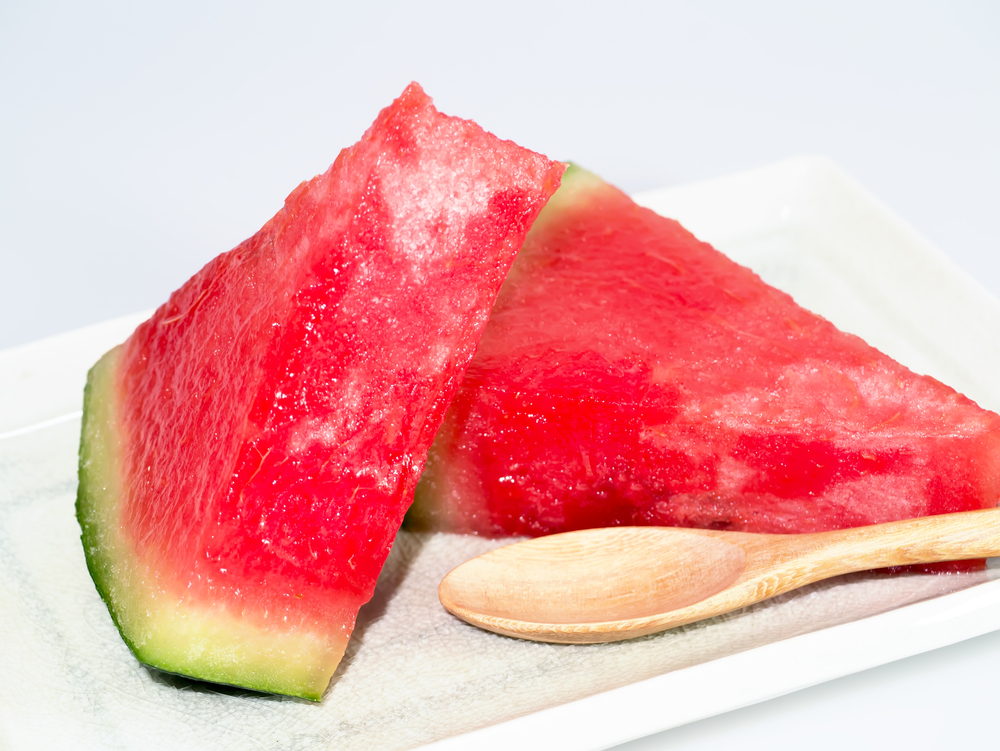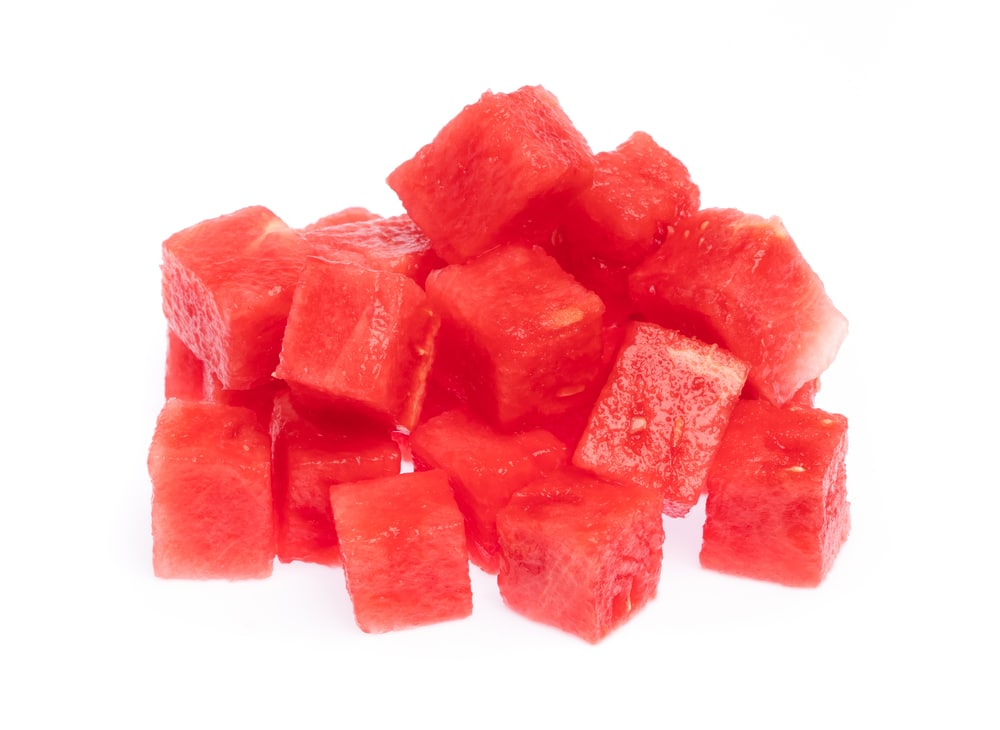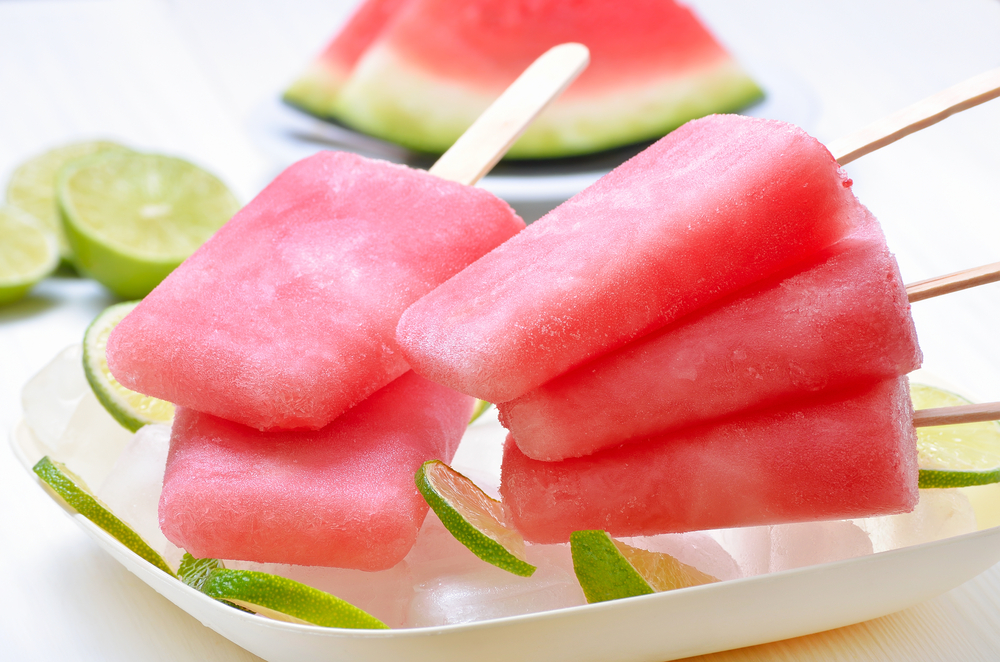Watermelon is an excellent fruit to freeze, and it offers an array of recipes you can make once you’re ready to consume it. There are two ways you can freeze watermelon—whole or in puree form. Both require relatively little space in your fridge since you’ll toss out the rind.

Can You Freeze Watermelon?
Yes, watermelon freezes well. You can freeze it in pieces or a puree, and you don’t have to dedicate hours to prepare it.
When thinking about whether you should freeze your watermelon, it’s essential to consider what you plan on using it for. In most cases, it’s best to freeze watermelon if you want to use it in smoothies and other recipes that require blending.
However, eating partially frozen watermelon can make a healthy treat that brings summer into your home at any time of the year.
How to Freeze Watermelon
Freezing watermelon is a fairly intuitive process, but there are some steps you’ll want to ensure you complete to avoid having a freezer disaster. We’ve got your back covered with this easy step-by-step process.
Step 1: Remove Waste:
Sticking a whole watermelon in your freezer, rind and all, won’t bode well when you’re ready to use the fruit. So, cut around the rind and remove the watermelon’s seeds while you’re at it. Those seeds get super hard in the freezer, and picking them out after you thaw your watermelon gets messy.
Step 2: Chop the Watermelon:

You can get as creative or basic as you want here, but our advice is to use a watermelon scooper to cut up your watermelon. Remember, frozen watermelon doesn’t maintain its texture when thawed. So, don’t worry about cutting the watermelon into specially sized pieces for eating.
Step 3: Perform a Flash Freeze:
Watermelon has a lot of water, so it’s crucial to flash freeze the pieces if you plan on using a little bit of watermelon at a time. If you’ll be using all your watermelon at once and don’t plan on eating the pieces whole, there’s no need to perform this step—you can skip to the next section.
To flash freeze, lay your watermelon pieces on a baking tray lined with parchment paper. Spread the pieces out so that none of them touch each other. Then, place the tray in your freezer and leave it there for a minimum of fifteen minutes. Once the pieces begin to freeze, take them out and proceed to step four.
Step 4: Pack into Freezer Bags:
Place your watermelon pieces into freezer bags and squeeze out all the air you can. You can even stick a straw in the bag and try to suck out some of the air. That said, vacuum sealers are ideal for freezing watermelon if you happen to have one.
The reason why it’s crucial to remove air from your watermelon is that it prevents freezer burn from setting in. Your watermelon will already come out of your freezer in a less texturized state than you put it in, and freezer burn will make the situation worse by drying out the fruit.
Step 5: Label the Bags:
The final step is to label your freezer bags with the date you put the watermelon in your freezer. That way, you can keep an eye on how long they’ve been in there so you can use them up before they start turning into a less desirable state.
Alternative Option: Freezing Pureed Watermelon
Since you may not want to snack on frozen watermelon once it comes out of the freezer, you also have the option to freeze the puree.
An advantage of pureeing over freezing watermelon whole is that watermelon loses some of its sweetness in the freezer. Therefore, you can add some sugar to the mix so that it comes out as tasty as when you picked it from your garden.
Pureeing watermelon doesn’t require any additives (unless you choose to add in some sugar). Once you’ve done so, pour the puree from your blender into ice cube trays. Let the puree freeze in the tray.
Then, remove the cubes and place them in a freezer bag, following our suggestions to get the bag as free of air as possible.
How Long Does Watermelon Last in the Freezer?
You can expect your watermelon to last around eight months in the freezer. You can certainly leave it in your freezer past this time, but the taste and texture will likely deteriorate even more than usual.
When you’re ready to use your watermelon, it isn’t the type of frozen food you should put in your fridge to thaw. Instead, if you want to try eating the watermelon straight, let it thaw on your counter slightly—but don’t go overboard. The more frozen watermelon thaws, the more it’ll lose its texture.
Alternatively, you can put the frozen watermelon directly into specific recipes, which we’ll cover shortly.
How to Tell if Frozen Watermelon is Bad:
When learning about how to freeze watermelon, it’s equally important to know how to identify when your frozen watermelon is bad. Some signs that you should throw out your frozen watermelon include:
- A slimy texture
- An off-color (often a brownish pink)
- Rotting smell
The Food and Drug Administration recommends keeping your freezer at zero degrees Fahrenheit or colder. Bacteria start to thrive at temperatures above 40 degrees. Therefore, if the power goes out or you have a malfunctioning freezer, take care with your watermelon—these are often the most common reasons that watermelon goes bad in the freezer.
No matter how careful you are about following the freezing steps we talked about here, watermelon preservation only goes so far if you don’t freeze the freshest watermelons that you have access to.
When selecting watermelons for freezing, the watermelon should sound hollow when you tap on its rind. It should also have a rich pink and juicy center. Needless to say, if you have a mediocre tasting watermelon, you can expect it to come out of your freezer just as mediocre, if not worse.
Frozen Watermelon Recipe Ideas

As you’ve likely gathered by now, the best use for frozen watermelon is almost always to blend it with a recipe.
Homemade watermelon sorbet is a wonderful way to bring summer into your home at any time of year. All you’ll need is to mix frozen watermelon with some sugar, lemon juice, and mint leaves if you fancy, and blend it in a food processor.
You can also use frozen watermelon in smoothies, mojitos, and lemonade. Alternatively, buy some popsicle molds and create healthy watermelon popsicles for your kids.
Finally, using watermelon cubes to keep drinks cold on a summer day is a sure-fire way to impress your guests. They look stunning in glasses of lemonade.
Frequently Asked Questions
Do you still have doubts or questions about freezing watermelon? We’ve rounded up answers to people’s most popular questions to help.
Technically you can freeze watermelon with the rind on. However, this isn’t a good practice because it’ll be more challenging to remove the watermelon from the rind once it thaws. Furthermore, watermelon loses its firm texture when it comes out of the freezer. Therefore, you’ll struggle with cutting through mushy flesh.
It’s best not to defrost watermelon. Instead, eat pieces of watermelon when they’ve had a chance to thaw slightly. Alternatively, use frozen watermelon in smoothies, popsicles, daiquiris, and for making colorful ice cubes.
Frozen watermelon contains an array of nutrients. It’s an excellent source of vitamin C and A. It also has notable amounts of potassium and magnesium. Furthermore, it has high concentrations of lycopene, which is responsible for its beautiful pink color and cancer-fighting properties.
If you consume watermelon within a couple of months after freezing it, you can expect the taste to closely resemble a fresh watermelon.
However, over time frozen watermelon loses some of its sweetness. You can rectify this by pureeing the watermelon with sugar before freezing it. The watermelon may also dry out a little in the freezer, despite your best attempts at keeping out air.







Your freezer should be at zero degrees (not your refrigerator). And you would use the frozen cubes to keep your drinks cold (not warm). But otherwise, a good article.
Hello Rene, thank you for reading and also catching those two typos! We’d made the updates now. All the best… 🙂